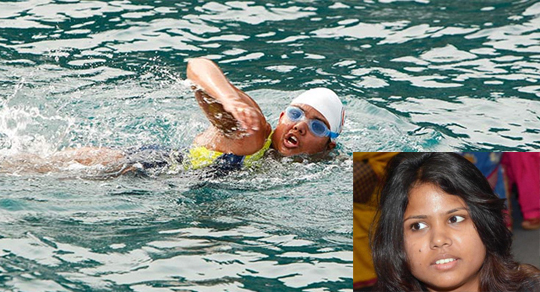Mumbai, Sep 8: Indian open water swimming champion Bhakti Sharma, who has set a world record by swimming 1.4 miles in 52 minutes in one degree temperature in the Antarctic Ocean, is seeking monetary help from citizens through an online crowdfunding platform to try her luck in the 2020 Tokyo Olympics.

The 26-year-old swimmer from Udaipur in Rajasthan, started swimming at a young age of two under the wings of her mother Leena Sharma. She is currently undergoing rigorous training sessions in suburban Vile Parle here where she is working hard to sharpen and maintain her form and rhythm.
Blessed with high stamina and capability to swim long distances, Bhakti said, "I am falling short of funds to complete my training and therefore I approached the team of fueladream.com to help me launch an online petition. So far, people have donated around two and half lakh rupees. But this amount is much below my expected target of Rs 1.5 crore that I would need to spend in coming four years of my preparation."
After setting the world record in 2015, Bhakti received accolades from Prime Minister Narendra Modi and it is then that the CEO of a Japanese MNC advised her to try crowdfunding as a viable and long term option.
"This is not the first time that I am looking for crowdfunding to fund my annual training costs. I have done it before while setting the world record too and now I am repeating it for 2020 Tokyo Olympics," said Bhakti.
The world record holder now wants to represent India at the Olympics in open water swimming.
"Open water swimming has been an Olympic sport since 2008 and I want to represent India in this event and hopefully win a medal. Nothing makes you more proud than representing your country on an international platform," she said adding that the only problem is that open swimming is not so popular in India.
On whether the state and centre governments are not forthcoming with the financial help Sharma said, "My home state government (Rajasthan) is not offering me any sort of monetary help. However, I am currently following the appropriate procedure with Union Sports ministry, and have written to them. They, after scrutiny, may allocate funds as it does to potential Olympic talents."
Describing the crowdfunding as a tool of resounding success for upcoming talents,Ranganath Thota, the Founder and CEO of fueladream.com said, "We are thrilled that fueladream could help a world class swimmer like Bhakti Sharma and also excited that the people of India have helped fund her campaign in quick time. It is in making Bhakti's dreams come true that the dreams of our country to win medals at Tokyo will be realised."





Comments
Add new comment